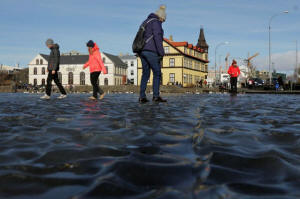|
Weathering Trump's skepticism, U.S.
officials still fighting global warming
 Send a link to a friend
Send a link to a friend
 [March 15, 2018]
By Timothy Gardner and Alister Doyle [March 15, 2018]
By Timothy Gardner and Alister Doyle
WASHINGTON/OSLO (Reuters) - U.S. President
Donald Trump has bashed international efforts to combat climate change
and questioned the scientific consensus that global warming is dangerous
and driven by human consumption of fossil fuels.
But there is a disconnect between what Trump says at home and what his
government does abroad. While attention has been focused on Trump's
rhetoric, State Department envoys, federal agencies, and government
scientists remain active participants in international efforts to both
research and fight climate change, according to U.S. and foreign
representatives involved in those efforts.
"We really don't detect any change with the Americans," said one of the
officials, Aleksi Härkönen of Finland, who chairs the eight-nation
Arctic Council's key group of senior officials, who are charged with
protecting a region warming faster than any other on Earth.
Over the past year, the United States has helped draft the rulebook for
implementing the Paris climate accord, signed international memoranda
calling for global action to fight climate change, boosted funding for
overseas clean energy projects, and contributed to global research on
the dangers and causes of the Earth's warming.

While the United States’ participation in international forums –
including the Paris accord and the Arctic Council - has been reported,
its continued, broad and constructive support for climate change efforts
in these gatherings has not.
This business-as-usual approach has surprised some of America’s foreign
partners, along with some of Trump’s allies, who had expected the new
administration to match its rhetoric with an obstructionist approach to
combating climate change.
"I am concerned that much of our climate policy remains on autopilot,"
complained Trump’s former energy adviser Myron Ebell, now a research
director at the right-leaning Competitive Enterprise Institute, who said
it reflects a failure by the administration to fill key positions and
replace staffers who oppose the president's agenda.
The U.S. efforts abroad to tackle climate change have been
counter-balanced by Trump's aggressive push at home to increase
production of the fossil fuels scientists blame for global warming. He
has also ordered a wide-ranging rollback of Obama-era climate
regulations and appointed a self-described climate skeptic, Scott
Pruitt, as the nation’s chief environmental regulator.
And to be sure, none of the U.S. dealings in international climate
efforts since last year have committed the United States to any
emissions cuts that would undermine Trump’s domestic energy agenda.
The State Department – which handles the bulk of U.S. climate policy
abroad - told Reuters it was still developing its global warming policy
under Trump.
"The State Department is working with the White House and the
interagency to further develop our approach to international climate
change diplomacy," State Department spokesman Ambrose Sayles said in a
statement before Trump sacked Secretary of State Rex Tillerson on
Tuesday.

"In the meantime, we will continue to participate ... to ensure a level
playing field that benefits and protects U.S. interests, and to keep all
options open for the President," Sayles said.
Tillerson's departure leaves a question mark over the future of U.S.
climate policy abroad. Tillerson was in favor of the Paris accord, while
his successor, Mike Pompeo, has expressed doubts about the science of
climate change. Climate advocates say they hope Pompeo will be too
distracted by tensions with Iran and North Korea to change the State
Department’s approach to climate change.
White House spokeswoman Kelly Love declined to comment.
ROLLBACK AT HOME, RULEBOOK ABROAD
Trump announced last year that he was withdrawing the United States from
the Paris Agreement to fight global warming, raising concerns among
other parties to the deal that Washington might attempt to torpedo the
accord or disengage from it completely.
That hasn't happened. Washington sent a 40-strong delegation to talks in
Bonn in November to help draft a new rulebook that will provide rules of
the road for the 200 participating nations. It was a smaller delegation
than Washington had sent to past meetings, but it still won praise from
fellow delegates for its work.
For example, Andrew Rakestraw – a climate negotiator for the State
Department since 2013 - co-chaired discussions on how to ensure that the
pledges by signatories are comparable and use the same accounting
standards - a point seen as critical to the success of the accord.
Nazhat Shameem Khan, chief negotiator for Fiji, which presided over the
talks, said the United States delegation was "constructive and helpful."
The U.N.’s climate chief, Patricia Espinosa, also called the U.S. role
constructive.
[to top of second column]
|

Tourists walk across water frozen into a ripple pattern on a pond in
Reykjavik, Iceland, March 11, 2018. REUTERS/Lucas Jackson

Thomas Shannon, the State Department's chief climate negotiator in
Bonn, did not respond to requests for comment. Rakestraw also did
not respond to calls and emails requesting comment.
A U.S. source familiar with the U.S. position at the talks, who
asked not to be named, said that U.S. delegates in Bonn were pushing
an agenda that resembled those of past administrations – stressing
that emerging economies like China follow the same rules as
developed nations and meet international standards for monitoring
and reporting emissions.
There was one jarring note: Washington sponsored a side event to
promote “clean coal.” Some other delegates said they were unhappy
with this, as they wanted the talks to focus on renewable energies.
Under the details of the accord, the United States cannot formally
withdraw until 2020.
ARCTIC MELTING AND SOLAR POWER
The State Department’s delegations to the Arctic Council are also
continuing their work in much the same way they did under President
Barack Obama - acknowledging that warming is real and should be
countered in planning everything from new shipping routes to the
protection of indigenous peoples.
Some U.S. agencies are also still bolstering international efforts
to fight climate change.
The Overseas Private Investment Corporation, which seeks to advance
U.S. policy by financing foreign business ventures, doubled its
support for solar projects in 2017 under a climate-friendly policy
last updated by the Obama administration.

And NASA, the U.S. space agency, continues to research climate
change, publish climate change data, and contribute to international
reports, spokesman Stephen Cole said.
Both OPIC and NASA are independent of the State Department, so would
not be under Pompeo's sway.
'NO CHALLENGE'
Scientists representing the United States in international research
say they have also been unfettered by the Trump administration,
despite concerns early in the Trump presidency that the White House
would seek to silence them or restrict their work.
“There has been no pressure on U.S. authors,” said one U.S.
scientist, who is now helping to write a United Nations report that
will call for coal to be “phased out rapidly” to limit global
warming - a direct clash with Trump's pro-coal agenda.
The scientist asked not to be named because the draft report from
the Intergovernmental Panel on Climate Change (IPCC), due to be
released in October, is confidential.
"Our U.S. colleagues know that climate change is not a hoax," said
one of the non-U.S. authors of the same report, who also spoke on
condition of anonymity.
Christopher Field, a professor of environmental studies at Stanford
University who co-chaired a 2014 IPCC report on the impacts of
climate change, agreed: “I’ve not seen any indication that the
climate denialism from Trump and other members of the administration
has had any influence ... on the alignment of the U.S. scientific
community with the scientific consensus around the world."
Still, scientists worry that while the Trump administration is not
interfering with their research it is ignoring it.
The Trump administration made no move to block an assessment by 300
experts last year that outlined the threats and causes of warming in
the United States and concluded there is “no convincing alternative
explanation” for climate change than human activity.
"But then they haven't acknowledged the findings, nor changed their
climate science denying stance,” said the U.S. scientist involved in
drafting the U.N. coal report.

(Additional reporting by Valerie Volcovici in Washington and Nichola
Groom in Los Angeles; Editing by Richard Valdmanis and Ross Colvin)
[© 2018 Thomson Reuters. All rights
reserved.]
Copyright 2018 Reuters. All rights reserved. This material may not be published,
broadcast, rewritten or redistributed.
Thompson Reuters is solely responsible for this content. |